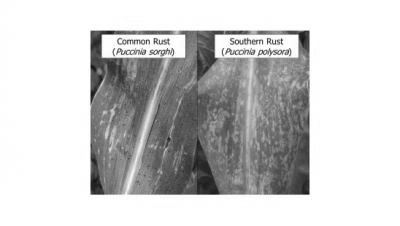Southern Rust In Kentucky: Information For Producers
PRINCETON, KY.
Southern rust on corn was confirmed by the University of Kentucky July 17 from a sample taken in Graves County and has been confirmed in several Western Kentucky counties since. While this is an earlier-than-normal occurrence of the disease, crop progress and timing are very important factors on whether it will cause significant yield losses, said Carl Bradley, UK extension plant pathologist with the College of Agriculture, Food and Environment.
Southern rust is caused by the pathogen Puccinia polysora, and most corn hybrids are susceptible to it. Since it overwinters mostly outside of the United States, its arrival in Kentucky varies every year, as its movement is dependent on weather. It usually arrives in the state too late to impact yields, but it caused yield losses for some Kentucky producers in 2016.
“The disease risk is relative to the corn’s growth stage,” Bradley said. “Late-planted corn is definitely at a risk for yield loss.”
Corn between the VT (tasseling) to the R3 (milk) stage may receive some protection from a foliar fungicide, if southern rust is present. The benefit from a foliar fungicide decreases as the plants reach the R4 (dough) stage. Corn at the R5 (dent) stage or beyond will not receive any benefit from a fungicide.
According to Kiersten Wise, UK extension plant pathologist, proper disease identification is critical because southern rust is easily confused with common rust, which does not usually cause yield losses. Growers who suspect they have southern rust in their fields should work with their local county extension agent to collect samples to send to the UK Plant Disease Diagnostic Laboratories in either Princeton or Lexington.
Producers can track the movement of southern rust on the Integrated Pest Information Platform for Extension and Education website, also known as iPiPE, http://ext.ipipe.org/. ∆

PHOTO: Carl Bradley, UK extension plant pathologist